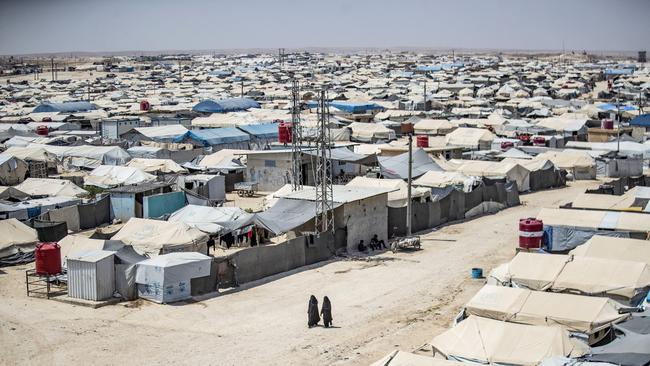
Terrorist group Islamic State wants to establish a new caliphate on Kurdish land in Syria, and the teeming al-Hol detention camp, home to 60,000 women and children, is at the heart of its ambitions.
The jihadist group once controlled territory across Iraq and Syria, but was defeated militarily in March 2019, when its final redoubt, the village of Baghouz on the Euphrates River in eastern Syria, was retaken by Kurdish fighters.
But it has spent the past three years regrouping and recruiting, and Kurdish officials now fear it plans to form a new caliphate, based around the restive Arab majority city of Hasakah.
The al-Hol detention camp, a squalid, dangerous three-square-kilometre area a short distance out of Hasakah, is acting as a honey pot, with Islamic State seeking to take control and break out the thousands of Islamic State adherents who live there.
Western officials do not believe Islamic State is yet ready to relaunch a caliphate, similar to the one it once controlled encompassing major cities in Iraq and Syria including Mosul and Raqqa. However, the group managed to carry out a sophisticated attack on the al-Sina’a prison in Hasakah in January which claimed around 500 lives and was only quelled with the help of American air strikes.
The attack, using suicide bombers, a truck bomb and 300 fighters who plotted with some of the 5000 Islamic State prisoners held in indefinite detention by the Syrian Democratic Forces, showed that Islamic State had significant capacity to act in a co-ordinated manner, with access to weapons, explosives and a large group of committed fighters.
In the days after the attack, SDF officials told US broadcaster Voice of America the operation was part of a larger plot by Islamic State to take and hold territory.
“They wanted to launch a large-scale attack on the area to spread once again their terrorism,” the SDF was quoted as telling Voice of America, adding the area was to be called the “Second Islamic State”.
Kurdish Autonomous Administration of North and East Syria Foreign Minister Abdulkarim Omar said Turkish military operations in northwest Syria would displace hundreds of thousands of people and divert the SDF away from Hasakah.
“Our military section, like SDF, will be busy to protect their people and protect their territory and it will be a chance for ISIS to become active and exist again and will become stronger so they will announce again a caliphate,’’ he told The Weekend Australian.
Dr Omar said the SDF had intelligence that Islamic State was planning to attack al-Hol camp to take control of it.
“The aim of attacking this prison was to liberate all ISIS that are in the prison. After that, they control Hasakah city, after that they will go to the al-Hol camp also, control it, and announce once again their caliphate in Hasakah,’’ he said.
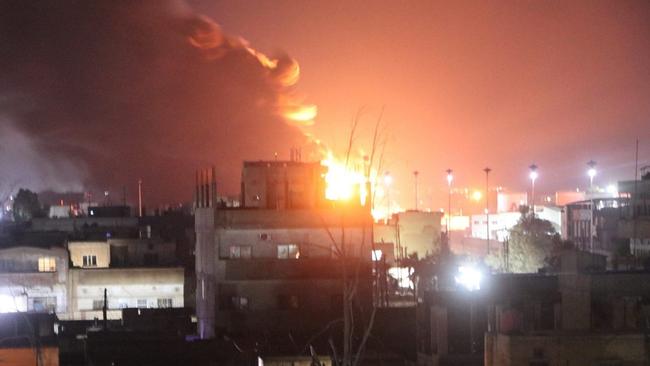
Australian expert Dr Haroro J. Ingram, a senior research fellow at George Washington University’s Program on Extremism, said he believed Islamic State was “a while away’’ from being able to establish the type of full-scale control of cities it had in 2014-15.
But he also said it was wrong to use the height of its caliphate as the benchmark for whether Islamic State should be taken seriously.
“The Islamic State movement transitioned to a global insurgency in 2018, and this is evident not only in the way it tries to present itself in its propaganda but its operational activities,’’ he said, adding that the group posed a “persistent threat in Syria, especially in the north”.
“The fact that its senior leaders have been found in the north suggests, I suspect, that the Islamic State has a degree of comfort/confidence in these areas.’’
He said the detention camps and the prisons holding Islamic State members would always be a target for Islamic State propaganda and operations.
“Prisons played an important role in the folklore around the generation of Islamic State leaders that helped the group rebuild after its near decimation in 2007-08.
“ISIS propaganda targeting detention facilities will continue to leverage those narratives of struggle and revenge reinforced by ‘breaking the walls’ operations.’’
Ingram said he was concerned about the impact of Turkish operations across Syria and Iraq.
“ISIS thrives on chaos and will look to exploit opportunities that emerge due to distracted/fighting adversaries.’’
The al-Hol camp remains a deep concern for Kurdish and US officials, who are lobbying for foreign countries to repatriate their citizens. Numerous women have escaped, including Australian jihadi bride Zehra Duman, who made it to Turkey, where she lives in the community with her children.
Apart from being an irresistible draw for Islamic State members, many of whom have families detained inside, the camp also allows the group to fundraise, and to money-launder and obscure the source of their funding.
A senior researcher at West Point’s Combating Terrorism Center, Audrey Alexander, detailed how extremists were using the camps for financial gain.
“Put simply, detention facilities like Al-Hol and Roj camps pose a security threat because they serve as financial hubs ripe for exploitation by violent extremists, designated terrorist groups, criminal networks, and corrupt officials,’’ Alexander wrote in her September report Cash Camps.
“Despite the efforts of the Syrian Democratic Forces and the Global Coalition to Defeat ISIS, evidence suggests that the camps are a growing asset for the Islamic State because they serve as hubs to draw and move funds, build ideological and financial support for the cause, and establish channels that benefit the organisation.

“Violent extremist groups and criminal networks, namely but not exclusively those associated with the Islamic State, use the camps holding Islamic State detainees for numerous activities involving the movement, use, and obfuscation of funds,’’ she wrote.
Alexander noted Islamic State propaganda had directed attention toward the plight of Islamic State detainees in the prisons and camps.
“Al-Hol is especially useful to violent extremist groups because of its security vulnerabilities, population, and its formal and informal economy and financial infrastructure,’’ she wrote.
While the borders of al-Hol are controlled by the Kurdish SDF, Islamic State controls the interior, running the schools, and meting out murderous justice to those deemed to have breached its rules. Citizens of 57 countries live there, including families of foreign fighters stuck in limbo because their home countries refuse to repatriate them. The women are forced to wear face-covering niqabs, and often hide their identities, moving between tents and giving false names.

Around 27,000 Iraqi detainees are held there, along with up to 19,000 Syrians and 12,000 mainly women and children from third countries. A handful of Australians are there, although the majority were moved to the safer al-Roj camp near the Iraqi border two years ago.
Around 100 people have been murdered in the camp in the past 18 months, according to the UN, including two women killed in May. The Syrian Democratic Forces intelligence unit, Asayish, reported an Iraqi woman was found handcuffed and decapitated.
The camp was built to house Iraqi refugees fleeing conflict in 1991, but was expanded and became a detention camp when the SDF was inundated with tens of thousands of women and children following the fall of Baghouz.
The joint executive director of international legal charity Reprieve, Maya Foa, said children languishing in camps could fall prey to Islamic State.
She said the US had been leading the way on repatriations because it was the right thing to do and “the sensible thing to do from a security perspective”.
“Australia and the UK are really among a small and diminishing number of countries that are holding out,’’ Foa said.
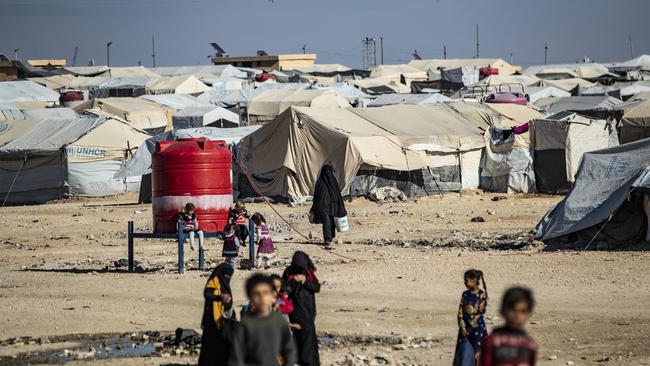
“In terms of why they are doing, all I can say is it’s a failing policy, a really reckless and irresponsible policy, governed perhaps by fear of headlines rather than proper politics, the interests of the security of the country.
“What we know from the experts – and this is what’s driving the countries that are repatriating – it is much safer to repatriate these families and men from northeast Syria than leave them here.
“The children are getting older, they’re getting more distressed. There are more rather than fewer of these – it’s a growing population, growing in terms of the ages but also the numbers, so it’s really unthinkable that the international community would be abandoning the Kurds, who don’t have huge amounts of resources to deal with this.
“They want to be focusing their efforts elsewhere, they have their own security to worry about, why should they be hosting the world’s prisons for all of the people who, without charge or trial, are perceived to be affiliated with Islamic State?
“It’s completely unsustainable and the Kurds know that and they are living with this community of people and they are calling for the international community to repatriate these families because they know it’s the right thing to do.
“And if anybody knows about the risk, it’s them. If they are saying that these people should go home, either be prosecuted or could freely live among us.
“They should know and the other countries should take their lead … and do what’s responsible.’’
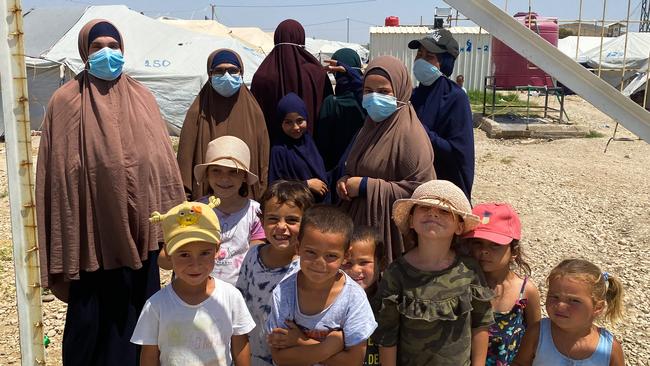
The UN’s Special Rapporteur for Counter Terrorism and Human Rights Professor Fionnuala Ni Aolain said “citizen-dumping’’ practices such as that applied by Australia and other countries was deeply problematic.
“In this case, a non-state actor (the Kurdish administration), which has no rights or legitimacy under international law, is given all of the responsibility – including the security headache of managing a population which they are unable to manage,’’ she said.
“The Kurds have been very clear about this. They do not want these nationals, these nationals are a security risk because, as the attack on al-Hasakah prison in January (shows), it’s like honey to bees.
“We have the spectre of ongoing Islamic State attacks to liberate or have access to these individuals.’’
Ni Aolain said as long as the camps and prisons continued to exist, they would pose a “massive security risk”.
“I sent a letter to the Australian government in respect of 56 Australians, women and children, who are currently held in the camps, making a really clear case around Australia’s obligation to repatriate them,’’ she said.
“I have not had a formal response from the government yet.’’
She was hopeful that the change of government under Anthony Albanese would “set a new tone’’ on Australia’s foreign policy and international law obligations.
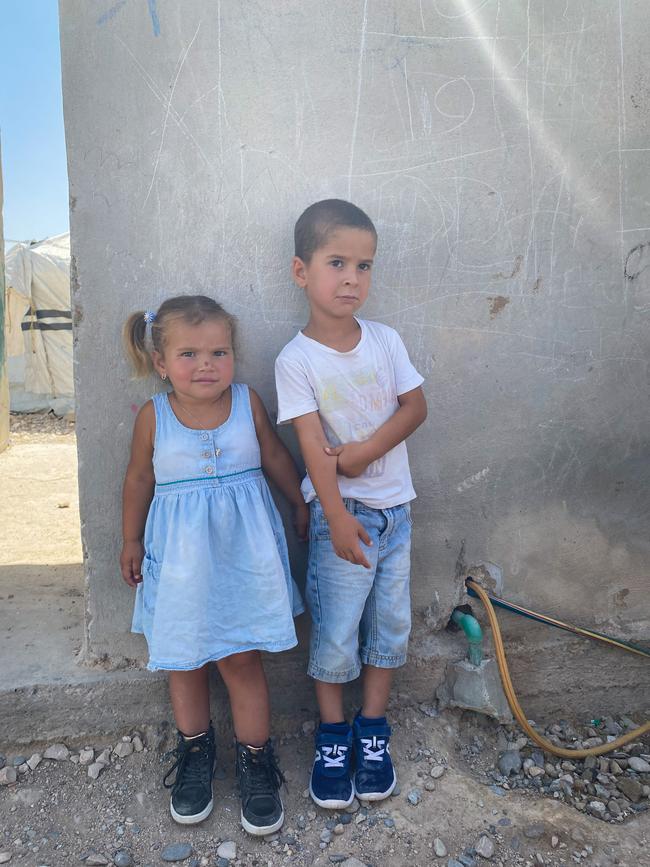
“Many governments find themselves in a difficult place on this question,’’ she said. “Some of that is because of the perceptions by the general public. These are not always a sympathetic group of nationals to bring home. There are fears for the security of the country with bringing home people who in the public’s eye, or in the media’s eyes, have been played as dangerous, radical terrorists or (have) associations with terrorism.
“What I would say is the countries that have successfully repatriated their nationals – and I have visited a number of those countries as Special Rapporteur – one of the key elements of successful repatriation is for governments to clearly articulate first of all that their child nationals are victims of terrorism.
“These children did not choose to be born to either their parents, or in northeast Syria. They are victims of terrorism and deserve to be treated as victims of terrorism.”
Home Affairs Minister Clare O’Neil told The Weekend Australian the Albanese government’s approach would be driven by “one single factor – the national security of Australia’’.
The Department of Home Affairs said it was “of course concerned about Australian women and children’’ in the camps and was keeping the matter under review.
Omar said the best solution was for each country to take their citizens back. “In this case, you will cut the road of danger,’’ he said.
“Unfortunately … after we defeated ISIS militarily, the international community, they turned their back and the ISIS prisoners and ISIS (families) are left with us to solve the problem.
“We cannot solve this alone. If they don’t help us, we can’t stand alone in front of this problem.’’

Add your comment to this story
To join the conversation, please log in. Don't have an account? Register
Join the conversation, you are commenting as Logout